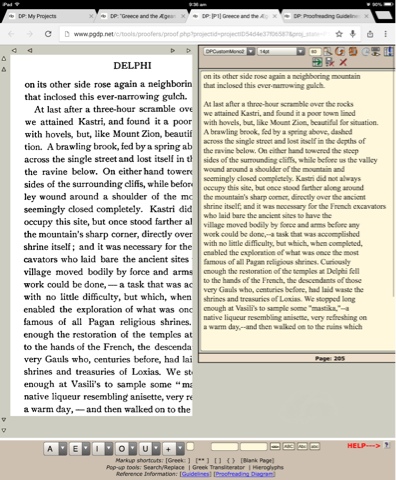I joined the Distributed Proofreaders Network the other week. I have really been enjoying my tasks as a volunteer proofreader. The electronic texts end up as free ebooks on Project Gutenberg (which I have used heavily for years), so it is nice to be able to give something back. (If you aren't familiar with Project Gutenberg, they focus on works published before 1923 in the US, and before 1953 in Australia, and they have made tens of thousands of books available.)
I'm currently proofreading on my iPad, which isn't ideal due to the limitations with the iPad web browsers. They just can't interpret the custom interface for the DP proofing tools, but I found Chrome behaves better than Safari. My iPad interface currently looks like this (screenshot joined to show scroll length):
Lots of limitations. The custom DP font doesn't display, the sizing of the interface is clunky, and adjustments make little or no difference after a certain point in regard to the custom width of the edit box pane or the image pane. However, proofing is certainly workable, it's just extra tapping and fiddling. In contrast, my netbook computer interface look like this:
Much better.
The eleven works I have been proofreading so far have been of varying interest. One of the works I proofed five pages from as a newbie was titled, 'A Treatise on the Diseases produced by Onanism, Masturbation, Self-pollution, and other excesses'. After I finished my newbie projects and received my feedback, I began other works; 64 pages from 'The Toxins and Venoms, and their Antibodies' (interesting), 23 pages from 'The Cure of Rupture by Paraffin Injections' (ghastly), 226 pages from 'Under Orders', 164 pages from 'A Description of Greenland', and 399 pages from 'Greece and the Ægean Islands'.
My home life is quiet at the moment. As indicated by my member stats, it's pretty clear that since joining DP I have been a bit of proofreading machine:
All those pages in 19 days... even I am a tiny bit impressed. After I finish my current projects, I'm going to focus on difficult proofreads, works with low-quality scans or complex content. Because I am a speed-reader, I don't really trust myself with catching all the OCR errors in easy works. I need text that is unclear and unfamiliar and requires all my focus, instead of easy texts which allow me to leave proofing mode and slip into reading mode.


